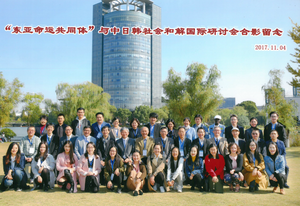23-25 November 2017 (Tokyo, Japan)
From 23rd to 25th November, the Global Forum on Science and Technology for Disaster Resilience 2017 was held at Science Council of Japan and National Art Center, Tokyo, Japan co-organized by Science Council of Japan (SCJ), United Nations International Strategy for Disaster Reduction (UNISDR), Integrated Research on Disaster Risk (IRDR), Public Works Research Institute (IRDR) and National Research Institute for Earth Science and Disaster Resilience (NIED).
The conference was opened by the opening remarks by Dr. Robert Glasser, the Special Representative of the UN Secretary-General for Disaster Risk Reduction, followed by Prof. Shuaib Lwasa, Chair, Science Committee, Integrated Research on Disaster Risk (IRDR), and Prof. Toshio Koike, Director, International Centre for Water Hazard and Risk Management (ICHARM) Public Works Research. Prof. Gordon McBean, President, International Council for Science ICSU, then delivered a keynote speech.
During the three days, eight plenary panel discussions including four for each priority action of the Sendai Framework were held, while three working sessions and poster presentations were organized as well. ADRC made a brief presentation in the prenary panel 1 on GLIDE and made comments in a poster session on the use of satellite imagery with JAXA. The draft of "Tokyo Statement 2017--Science and technology action for a disaster-resilient world was discussed. At the end of the three days, a high level session took place in the presence of His Imperial Highness the Crown Prince.
From 23rd to 25th November, the Global Forum on Science and Technology for Disaster Resilience 2017 was held at Science Council of Japan and National Art Center, Tokyo, Japan co-organized by Science Council of Japan (SCJ), United Nations International Strategy for Disaster Reduction (UNISDR), Integrated Research on Disaster Risk (IRDR), Public Works Research Institute (IRDR) and National Research Institute for Earth Science and Disaster Resilience (NIED).
The conference was opened by the opening remarks by Dr. Robert Glasser, the Special Representative of the UN Secretary-General for Disaster Risk Reduction, followed by Prof. Shuaib Lwasa, Chair, Science Committee, Integrated Research on Disaster Risk (IRDR), and Prof. Toshio Koike, Director, International Centre for Water Hazard and Risk Management (ICHARM) Public Works Research. Prof. Gordon McBean, President, International Council for Science ICSU, then delivered a keynote speech.
During the three days, eight plenary panel discussions including four for each priority action of the Sendai Framework were held, while three working sessions and poster presentations were organized as well. ADRC made a brief presentation in the prenary panel 1 on GLIDE and made comments in a poster session on the use of satellite imagery with JAXA. The draft of "Tokyo Statement 2017--Science and technology action for a disaster-resilient world was discussed. At the end of the three days, a high level session took place in the presence of His Imperial Highness the Crown Prince.
(2017/12/10 12:30)


